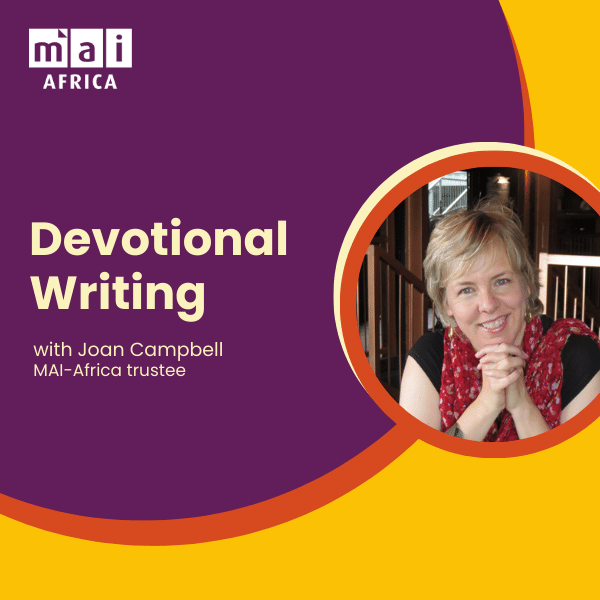By Joan Campbell, MAI-Africa trustee
Have you ever considered writing devotionals? A devotional is a personal story which connects the events of our daily life with Scriptures and the ongoing activity of God. It is one Christian sharing with another an insight or struggle about what it means to live faithfully. God has used many such ‘faith stories’ to encourage me, often simply in the realization that others are experiencing the same struggles as I am. God has also used devotionals to convict me of my sin, such as one based on Matthew 7:5 where I recognized that I was looking at the speck in my family member’s eye while I had a log in my own!
A few years ago, MAI published a beautiful devotional book called Light for the Writer’s Soul, written by Christians from across the world. We shared some of these devotionals on our MAI-Africa Facebook group in our ‘Sunday Devotional’ slot. Now on Sundays we share devotionals written by our group members. These have encouraged and uplifted us and given contributors a supportive place to share their work and hone their writing skills. A few of our members have asked for direction on writing devotionals and so I have drawn together this guideline for those interested in this valuable writing ministry.
Elements of a good devotional
Devotionals are as different as the people who write them but good devotionals all have a few elements in common:
- They ‘draw’ the audience in and connect with them.
- They give readers some thought or insight on their relationship with Jesus and how to follow Him more closely in their day-to-day life.
- The foundation of a good devotional is the writer’s relationship with Jesus. We won’t have anything of value to share with others if we are not nurturing our friendship with the Lord, particularly through prayer and spending time in the Word.
- Most devotionals are fairly short—between 250 to 500 words.
How to write a good devotional
Here are a few suggestions for writing engaging devotionals:
Consider your audience
Take time to learn more about your readers. For instance, our MAI-Africa Facebook group is made up of writers living mainly in Africa. Devotionals that address the challenges they face, that call them to deepen their relationship with God and stay faithful to their call to write are ones that will impact them.
Choose a relevant Bible verse
Although your faith story is drawn from your life, the lesson should always be drawn from Scripture. Choose a verse that brings together your illustration and lesson. Mine the riches of the verse for yourself before you share it. Read it in various Bible versions, consider its broader biblical context, reflect and pray. I am grateful that the writer of the ‘log in the eye’ devotional did this because that particular verse has stayed with me and allowed God to often bring to mind the lesson of not judging another.
Make a single point
In a devotional, you are presenting somebody with a single flower, not an entire bouquet. It’s tempting to try and cram in multiple lessons but this is not a sermon and your word count is limited. I was recently reminded of the power of God in giving us a single truth to ponder on when I listened to a reflection on the need to build silence into our lives. In a world with so much noise and content, I reflected quietly and deeply on this single thought for a few days to see where God was inviting me to make changes to my life.
Write sincerely and compassionately
Write with humility and compassion to connect deeply with your audience. A few months after my father passed away, I wrote a reflection in my book Journeys based on Jesus raising Lazarus. I shared my grief that, unlike Mary and Martha, I did not get my loved one back. Yet I also shared the comfort I took in the promise of resurrection. Writing vulnerably about my sorrow allowed me to share my hope in Jesus with others who were grieving.
Draw readers through engaging writing
Bring your devotional alive with descriptive writing. Readers will more fully experience your story if they can see, hear, smell, taste or touch the scene. Also, avoid using clichés and Christian jargon, which can be a barrier to engagement.
We write devotionals to share our Christian journey with others, trusting that God will use our story to encourage and bless their lives. Yet often I have found that the one most blessed in the process is me, the writer! Sharing what God is doing in our lives through this type of writing is a form of remembering His faithfulness, expressing our gratitude, glorifying Him and magnifying His name in the world. Devotional writing is our unique way of being true to the Lord and obeying His command to share the good news. “Declare His glory among the nations, His marvelous works among all the peoples!” (Psalm 96:3 ESV)
Devotional writing prompts
Here are some questions and ideas to spark your writing:
Your relationship with God
Consider your favorite Scripture verses. What do they mean to you and when has God used them to speak into your life? What Bible study or sermon has spoken to you or challenged you? Look through your journal for some rich inspiration.
Life experiences
Has anything specific happened in your life that has had an impact on you? This could be a trip you’ve made, a major event or life change, or a trial you’re going through (many devotionals come out of people’s trials). Find a verse that links to the experience and lesson you’ve learnt. Look for a Bible character going through a similar situation and draw inspiration from the Scripture under the guidance of the Holy Spirit.
Everyday life
Daily life is another good source for material. Consider your various relationships with family, friends or colleagues (God teaches us much in dealing with people). Notice things you see in nature or hear in conversations or at courses. Examine your thoughts and feelings.
Where to share devotionals
Think creatively of places where you could share your devotional writing:
Your own channels
I often share devotionals on my own blog. If you have an email list, share your devotionals directly via an email or email newsletter.
Other publications
Certain publications like The Upper Room and Unlocked invite submissions (make sure you read their guidelines carefully).
Other blogs
Become a regular contributing writer for another blog. A friend of mine, Kate, hosts a beautiful blog for women called Cup of Faith where she and several other South African writers share weekly. Alternatively, you could be invited (or get a little bold and ask!) to be a guest writer on a blog, such as Katherine Blessan’s devotional for the Christian Sister’s Network blog.
Social media
Consider sharing your devotionals on social media platforms such as Facebook and WhatsApp. Create audio devotionals for a podcast, or video devotionals to share on platforms like YouTube. By using social media your devotionals can reach a wide audience across the world – The Daily Devotional Facebook page has 138,000 followers!
A collaborative devotional book
Draw together other writers and create enough content for a devotional book on a specific topic. Kirime Barine, one of our MAI-Africa trustees, invited writers in Africa to contribute devotionals based on Bible characters facing suffering. He then made the book available as a free download to bless anybody facing struggles and grief of their own.
Devotional writing is a wonderful way to share our faith journey with others. We don’t know who needs to hear them but God does. As we faithfully record them and—like seeds—toss them out into the world, God will take them where they need to go and plant them in just the right hearts. Where have you shared—or could you share—your devotionals? Please give us your thoughts in the comments below.
Joan Campbell shares her faith journey through blogging, devotional and fiction writing. Her devotionals have appeared in The Upper Room and Scripture Union’s Closer to God publication. Joan is an MAI-Africa trustee and lives in Johannesburg, South Africa. In addition to her involvement in the training ministry of MAI, she builds community, equips and encourages writers online in her communications and social media role.
- Sign up to receive MAI-Africa’s newsletters
- Join the MAI-Africa Facebook group
- Register to receive the link to the next MAI-Africa prayer meeting (first Monday of the month at 6 p.m. East Africa Time)

